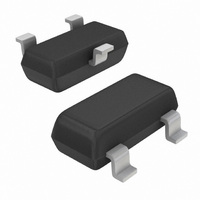SL15T1 ON Semiconductor, SL15T1 Datasheet - Page 4

SL15T1
Manufacturer Part Number
SL15T1
Description
TVS LO CAP 300W 15V ESD SOT23
Manufacturer
ON Semiconductor
Specifications of SL15T1
Voltage - Reverse Standoff (typ)
15V
Voltage - Breakdown
16.7V
Power (watts)
300W
Polarization
Bidirectional
Mounting Type
Surface Mount
Package / Case
SOT-23-3, TO-236-3, Micro3™, SSD3, SST3
Applications
General Purpose
Number Of Circuits
1
Voltage - Working
15V
Voltage - Clamping
24V
Technology
Diode Array
Lead Free Status / RoHS Status
Contains lead / RoHS non-compliant
Other names
SL15T1OS
Available stocks
Company
Part Number
Manufacturer
Quantity
Price
Company:
Part Number:
SL15T1
Manufacturer:
ON Semiconductor
Quantity:
75
Part Number:
SL15T1
Manufacturer:
ON/安森美
Quantity:
20 000
Company:
Part Number:
SL15T1G
Manufacturer:
ON Semiconductor
Quantity:
60 703
Company:
Part Number:
SL15T1G
Manufacturer:
ON Semiconductor
Quantity:
94
Company:
Part Number:
SL15T1G
Manufacturer:
ON
Quantity:
30 000
Company:
Part Number:
SL15T1G
Manufacturer:
ON
Quantity:
30 000
Part Number:
SL15T1G
Manufacturer:
ON/安森美
Quantity:
20 000
total design. The footprint for the semiconductor packages
must be the correct size to insure proper solder connection
drain pad size. This can vary from the minimum pad size
for soldering to a pad size given for maximum power
dissipation. Power dissipation for a surface mount device is
determined by T
temperature of the die, R
the device junction to ambient, and the operating
temperature, T
sheet for the SOT–23 package, P
follows:
ratings table on the data sheet. Substituting these values
into the equation for an ambient temperature T
one can calculate the power dissipation of the device which
in this case is 225 milliwatts.
of the recommended footprint on a glass epoxy printed
circuit board to achieve a power dissipation of 225
milliwatts. There are other alternatives to achieving higher
power dissipation from the SOT–23 package. Another
alternative would be to use a ceramic substrate or an
aluminum core board such as Thermal Clad . Using a
board material such as Thermal Clad, an aluminum core
board, the power dissipation can be doubled using the same
footprint.
Surface mount board layout is a critical portion of the
The power dissipation of the SOT–23 is a function of the
The values for the equation are found in the maximum
The 556 C/W for the SOT–23 package assumes the use
P
INFORMATION FOR USING THE SOT–23 SURFACE MOUNT PACKAGE
D
MINIMUM RECOMMENDED FOOTPRINT FOR SURFACE MOUNTED APPLICATIONS
= 150 C – 25 C = 225 milliwatts
A
. Using the values provided on the data
J(max)
P
556 C/W
D
=
, the maximum rated junction
qJA
T
J(max)
, the thermal resistance from
R
qJA
– T
D
A
can be calculated as
SOT–23 POWER DISSIPATION
A
of 25 C,
http://onsemi.com
SL05T1 Series
SOT–23
4
interface between the board and the package. With the
correct pad geometry, the packages will self align when
subjected to a solder reflow process.
temperature of the device. When the entire device is heated
to a high temperature, failure to complete soldering within
a short time could result in device failure. Therefore, the
following items should always be observed in order to
minimize the thermal stress to which the devices are
subjected.
* * Soldering a device without preheating can cause
excessive thermal shock and stress which can result in
damage to the device.
The melting temperature of solder is higher than the rated
Always preheat the device.
The delta temperature between the preheat and
soldering should be 100 C or less.*
When preheating and soldering, the temperature of the
leads and the case must not exceed the maximum
temperature ratings as shown on the data sheet. When
using infrared heating with the reflow soldering
method, the difference shall be a maximum of 10 C.
The soldering temperature and time shall not exceed
260 C for more than 10 seconds.
When shifting from preheating to soldering, the
maximum temperature gradient shall be 5 C or less.
After soldering has been completed, the device should
be allowed to cool naturally for at least three minutes.
Gradual cooling should be used as the use of forced
cooling will increase the temperature gradient and
result in latent failure due to mechanical stress.
Mechanical stress or shock should not be applied
during cooling.
inches
mm
SOLDERING PRECAUTIONS









